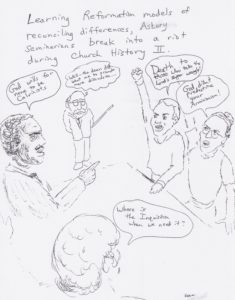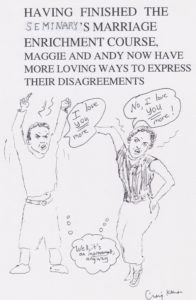A professor’s fan mail
Miracles interview with Ratio Christi (28.37 video)
Available here: https://youtu.be/M9h_EbXf-AY?list=PLmcvkSe5v1KGvZUBK0KZZi8A5xRCkjB5C
They asked great questions!
Moses as a third-culture kid—Exodus 2:7-10
Did Moses know that he was a Hebrew? Contrary to some of the movies we see (including my beloved Prince of Egypt!), he presumably did. In many periods in Egypt’s history, Asians could serve in the Egyptian court. Disloyalty to Egypt, however, would be harshly punished. A Hebrew less than fully assimilated in Egyptian culture and too Egyptian to be trusted by many of his fellow Hebrews, Moses was like what we call today a “third culture kid” (like many children of immigrants, refugees, missionaries, diplomats or other cross-cultural settings, and sometimes like children in bicultural homes). (Midianites who met him viewed him as Egyptian, Exod 2:19.)
In some cultures a child can identify with multiple cultures, but Moses grew up in a setting of prejudice where his Hebrew identity would have counted as a liability. So Moses grew up as a Hebrew, but also in Egyptian culture. This experience continued until he grew up (Exod 2:11).
Miriam interceded for Moses when she saw the compassion of Pharaoh’s daughter, offering to secure a Hebrew wetnurse for the child (Exod 2:7). The period of nursing might take two years, and the nurse needed to be one who could provide milk for the child—in this case, Moses’s own mother, who now got paid to nurse her own baby (2:8-9).
Although Moses’s mother was able to nurse him, once he was weaned she had to return him to Pharaoh’s daughter, who adopted Moses as her own son. The new mother also named him “Moses,” commemorating her finding him and drawing him from the water (2:10). “Moses” is not an unusual component of an Egyptian name, but Pharaoh’s daughter may have used a wordplay on the Hebrew words for drawing him out of the water because the child was a Hebrew. (Although the Hebrews lived in close proximity, in Goshen, in state servitude but living in their own mud-brick homes, she may have had to consult with Hebrew servants or others to find the right wordplay.) The providential irony here is that under Moses’s leadership God would someday deliver all his people through water.
Moses thus grew up in privilege, yet was also aware that he was Hebrew. Moses belonged to two cultures, but an event would soon force him to choose one at the expense of the other—in the short term costing him both (Exod 2:11-15).
(For other posts on Exodus, see http://www.craigkeener.org/category/old-testament/exodus/.)
Arguing after taking marriage enrichment
The Spirit as a distinct person
72-second video:
Miracles lecture at Purdue (video)
Symposium Christi
Go to: https://livestream.com/FocusingonExcellence/Symposium-2017 and click “Watch Again.” The event content starts at time 33:10 on the timeline.
OR:
On Youtube: https://www.youtube.com/watch?v=A-O4koeiNGc The event content starts at time 33:25 on the timeline.
Where was God when tragedy happened?—Exodus 1:22
Sometimes in the midst of history, injustice seems to prevail. In light of a longer view, and especially an eternal view, however, justice will win out. This becomes evident over the span of a generation in the ensuing context of our present passage.
Before Pharaoh decided to oppress Israelites, they multiplied and became very strong (Exod 1:7). This was why the king decided to enslave them to begin with (1:8-11). But as he afflicted them, they multiplied still more (1:12)! So the king’s next strategy was to kill newborn Israelite males secretly, leaving any possible blame in the event of discovery on the Hebrew midwives (1:15-16). Yet this strategem, too, failed (1:17-19), and the refrain continues: the people multiplied and became very strong (1:20).
Finally Pharaoh now decides to take action more directly. The Hebrew midwives had not killed Israelite babies at birth, so Pharaoh ordered his own people to kill newborn Israelite males (1:22). (Aaron was three years older than Moses, and would not be among the children affected by the king’s decree; see 7:7.)
Ironically and unknown to Pharaoh, however, his own daughter would undermine his decree out of compassion for a Hebrew baby (2:6-10)—Israel’s future deliverer. God does not always prevent tragedy—but he does ensure his plan for the future of his people and for ultimate justice.
Indeed, Exodus resounds with the recognition that God, while not always stopping human wickedness, does not look the other way: Consider how God would return against the next generation of Egyptians what Pharaoh had done. Pharaoh drowned Israel’s babies in the Nile (1:22); the first plague would turn the Nile to blood (7:20). Pharaoh drowned Israel’s babies in the Nile (1:22); the last plague would strike Egypt’s firstborn children (12:29). Pharaoh drowned Israel’s babies in the Nile (1:22); God would drown Egypt’s army in a sea of reeds (14:28). Though long delayed, justice would come. As we often say in the African-American church, “God doesn’t always come when you want Him to, but He’s always right on time.”
(For other posts on Exodus, see http://www.craigkeener.org/category/old-testament/exodus/.)
Dogmatics
God loves atheists (2-minute video)
For those who prefer text, it appears below the video:
God loves atheists, and so do I. Jesus calls his followers to love our neighbors as ourselves. While some atheists are spiteful in denouncing the Lord we love, and all of us his followers, as simple-minded, Jesus also told us to love our enemies and even modeled this love for us by laying down his life and forgiving his executioners. He urges us to pray for those who persecute us. Moreover, some Christians on the internet have denounced atheists no less spitefully, though 2 Timothy urges us to be kind toward all, responding with patience and gentleness if we respond at all. If you’re an atheist, please forgive our people who have treated you with hostility. Not all atheists are hostile to believers; some simply do not find reason to believe, and they are sincere in their unbelief. I know, because I was once an unchurched atheist, and would never have known that there is good reason to believe had I not met the Lord for myself. Alister McGrath, William Lane Craig and some other Christian scholars who engage atheists most fruitfully were themselves once atheists, and therefore are able to care about engaging atheists in a way that some other Christians don’t. If you’re a Christian who doesn’t love atheists, I urge you to consider your heart. God loves atheists. If he hadn’t, I never would have come to know his love in Christ.




